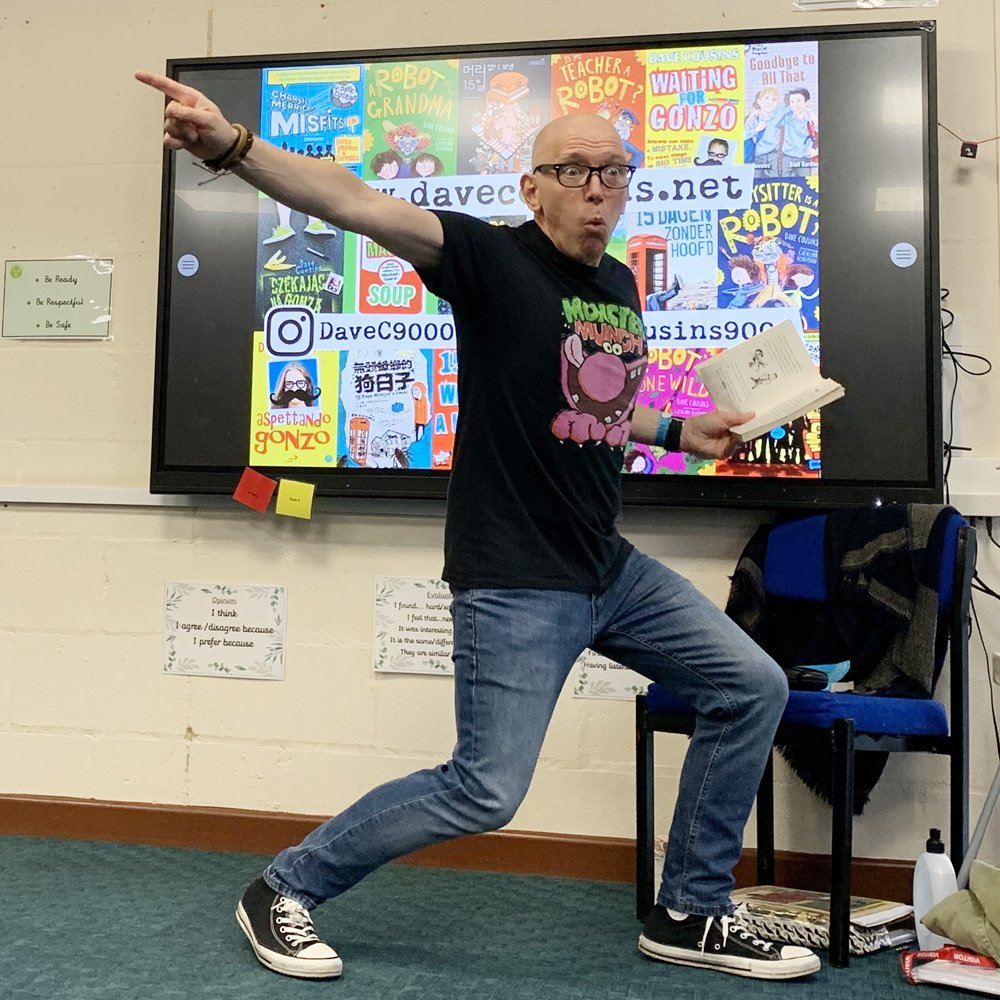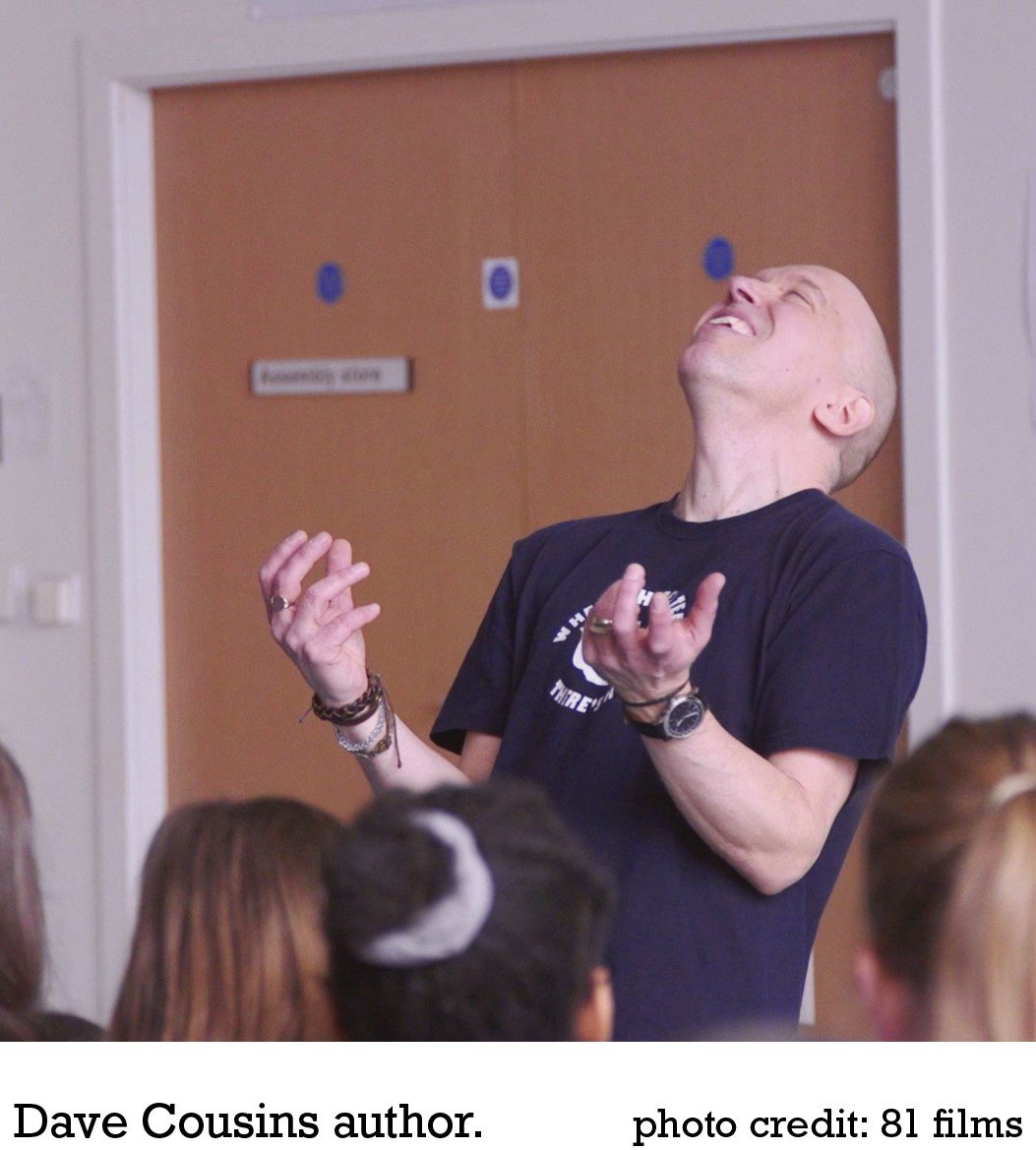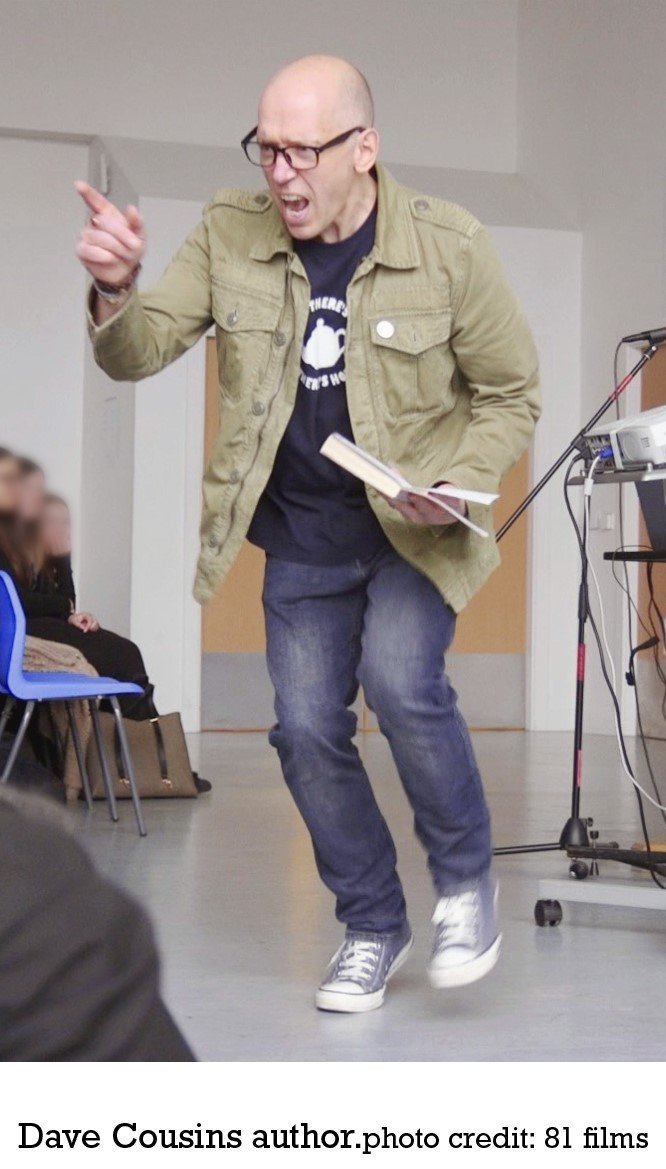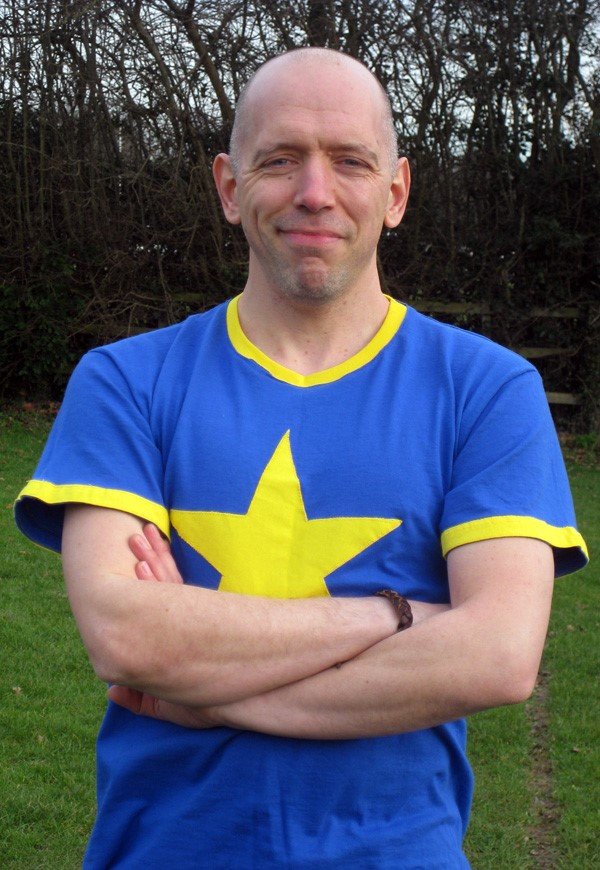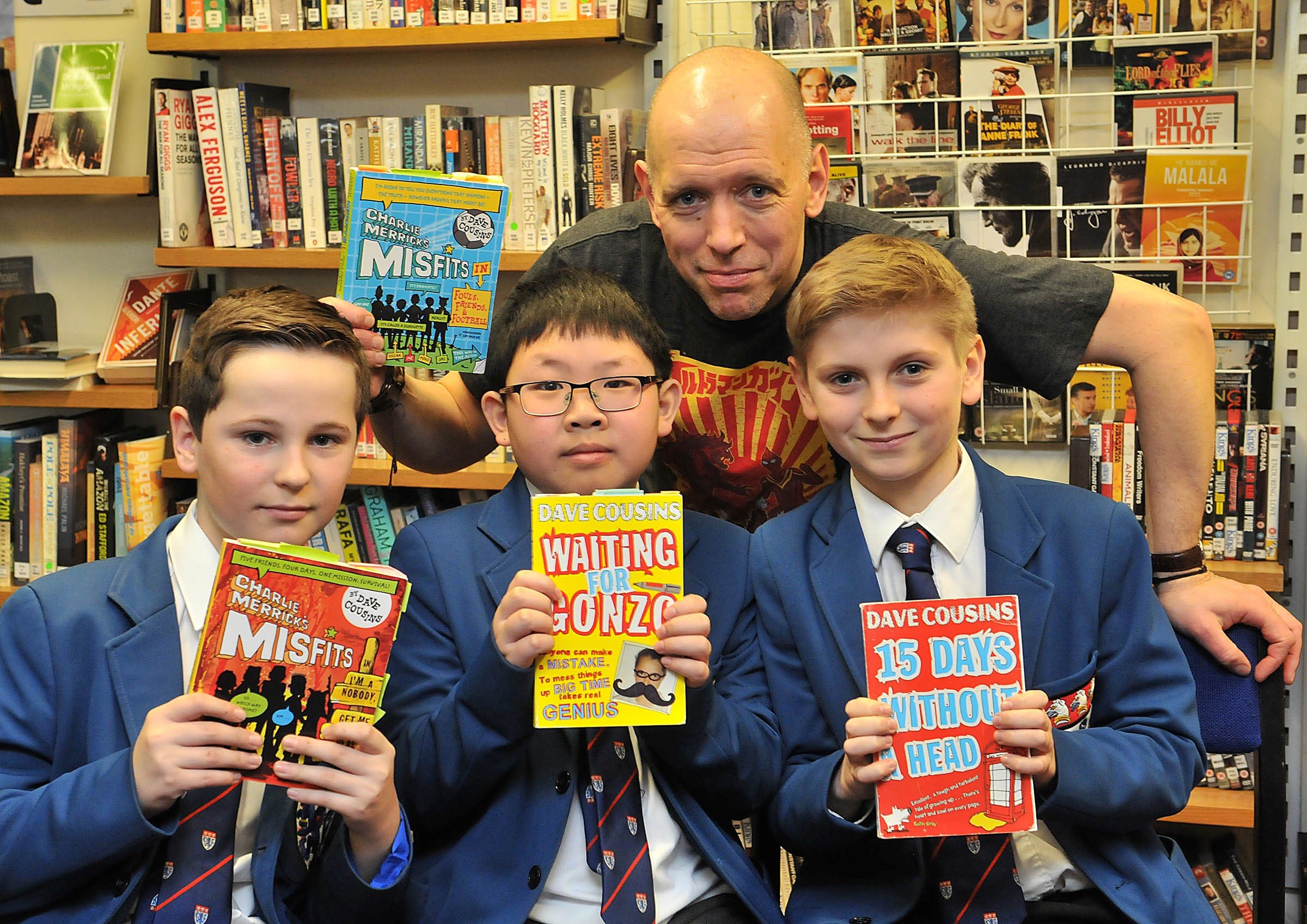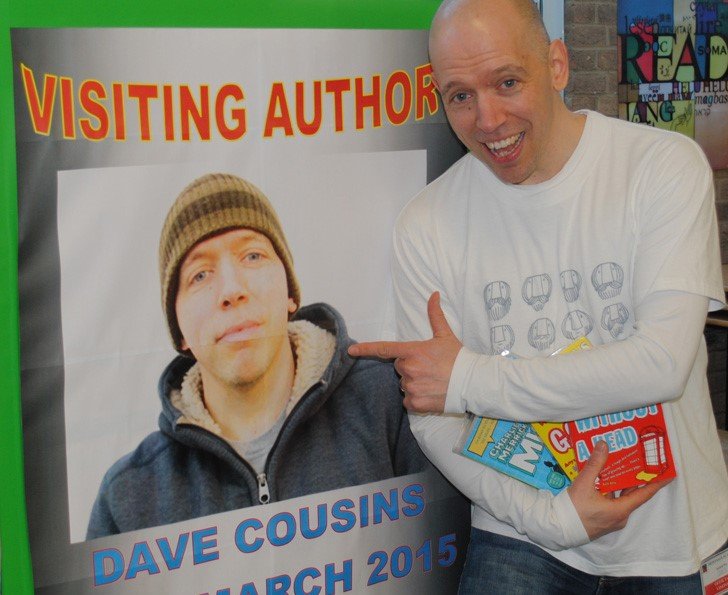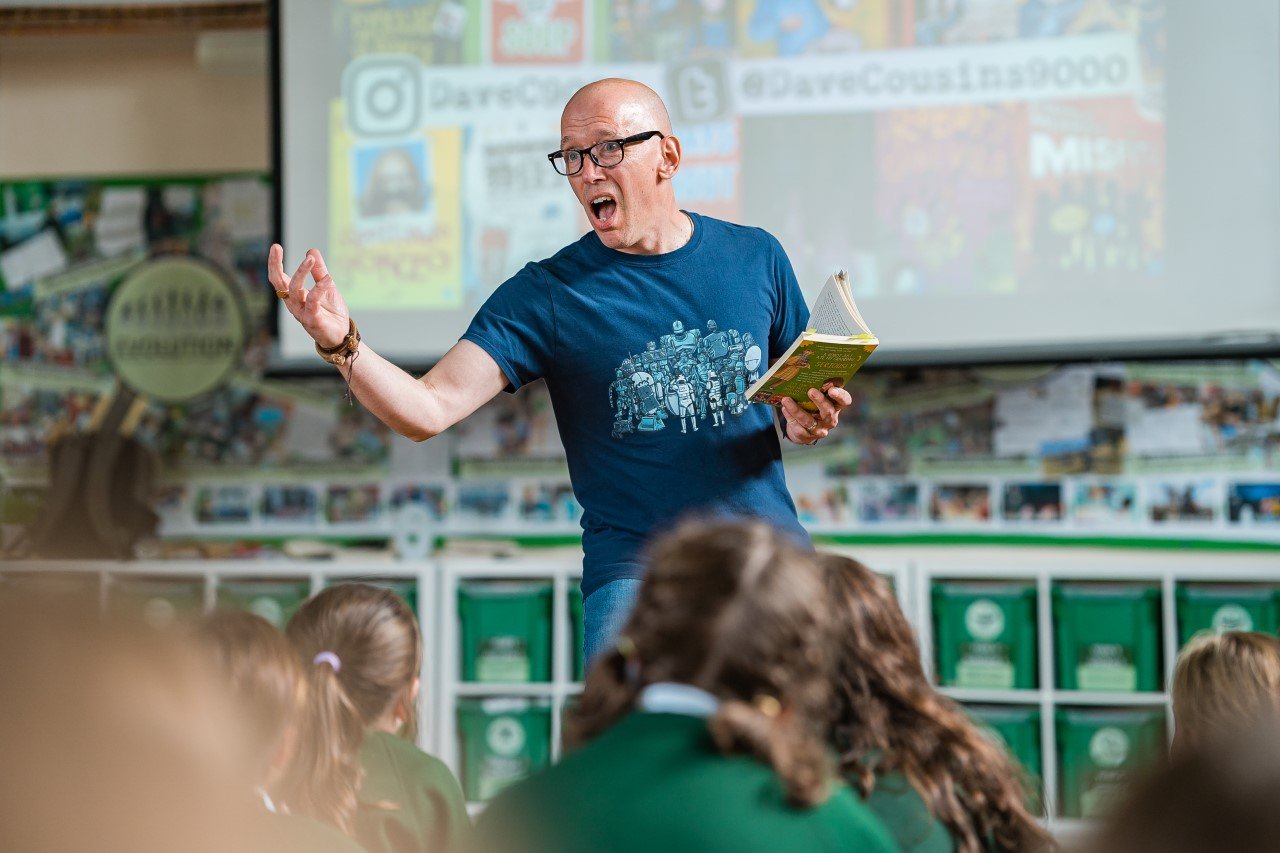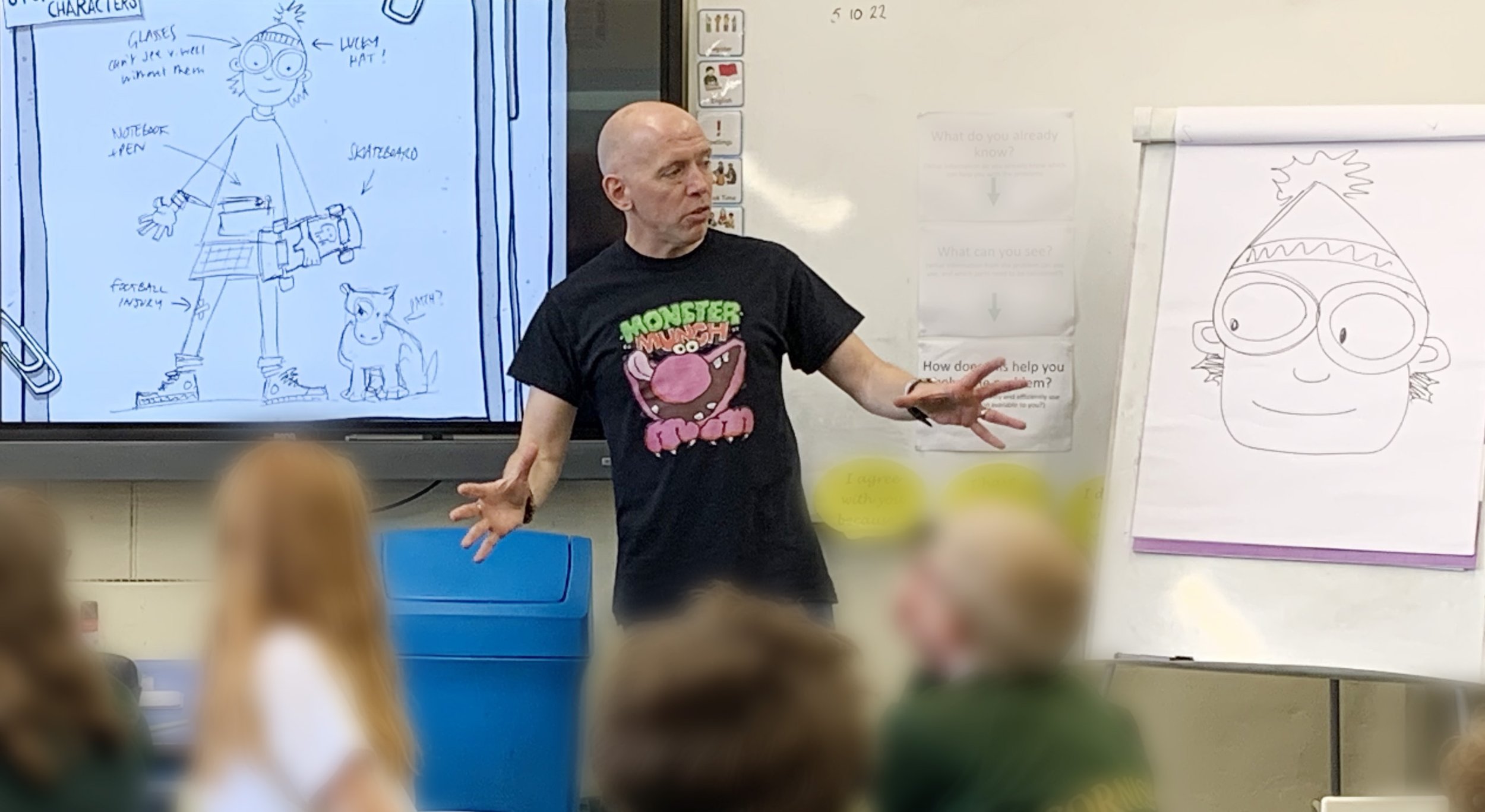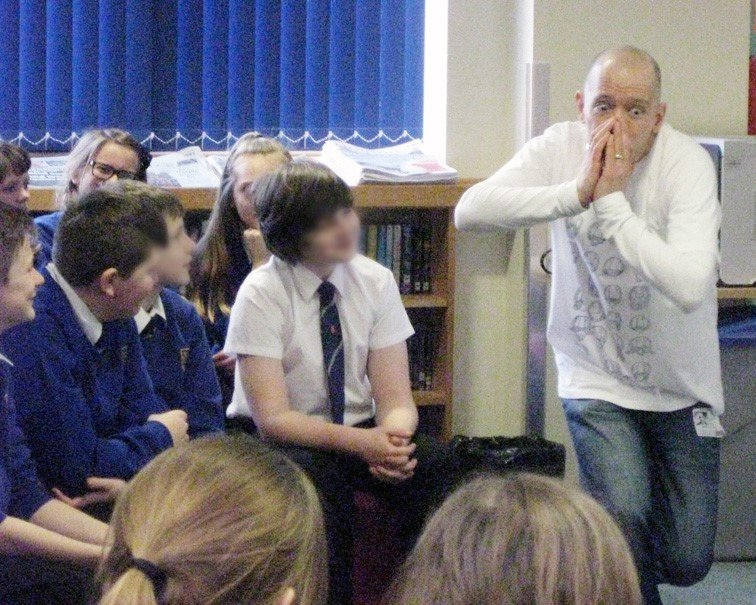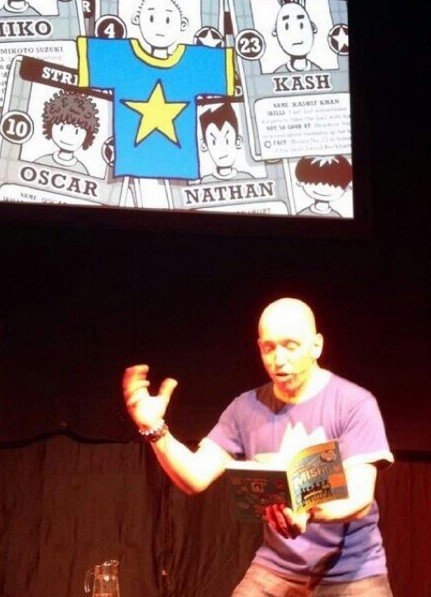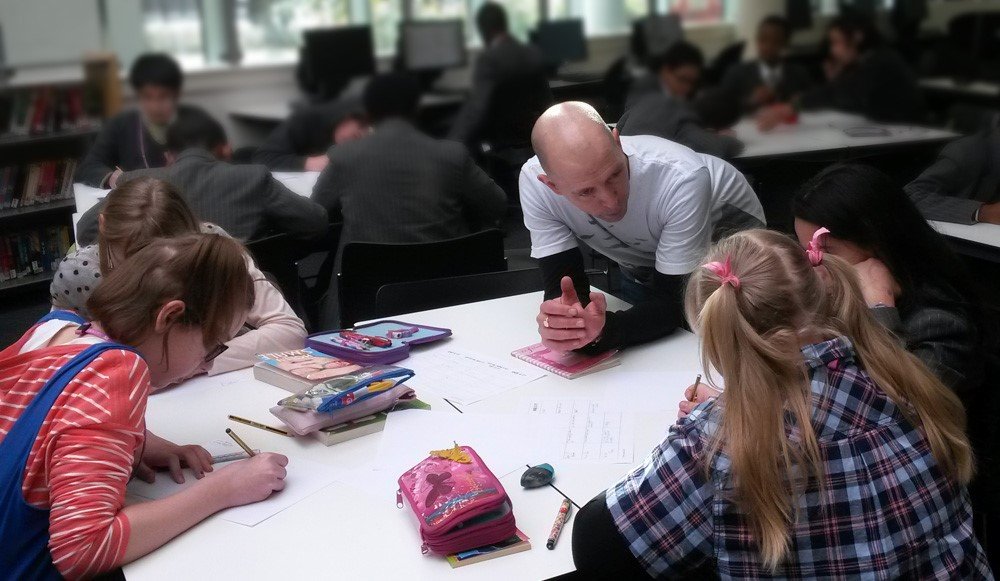July - Artist of the Month – Dave Cousins
Our July ‘Artist of the Month’ is author and illustrator Dave Cousins.
About Dave Cousins.
Dave Cousins has written a number of award-winning books for children and teenagers, published in multiple languages across the world.
Abandoning childhood plans to be an astronaut—or Batman—Dave went to art college in Bradford, joined a band and was nearly famous! His writing career began aged ten, drawing comics and penning lyrics for an imaginary pop group. Dave says that reading and writing stories helped him navigate the ups and downs of growing-up, and hopes that his books will play a similar role for today’s readers.
Dave’s books have been hailed as "realism with action, humour and heart". Published in over twelve languages, 15 Days without a Head was a Sunday Times Children's Book of the Week, a Junior Library Guild Selection in the US, and has won awards in both the UK and Europe. Waiting for Gonzo won the Grampian Children's Book Award, and was shortlisted for the prestigious German Children’s Literature Prize in 2017. Gonzo also has its own original soundtrack album and music videos! Both books were nominated for the Carnegie Medal.
Dave is also the author/illustrator of the Charlie Merrick's Misfits series – highly illustrated novels for slightly younger, or less confident, readers. The first Charlie Merrick's Misfits adventure Fouls, Friends & Football was described as “football—Tom Gates style”. It was selected for the Book Trust School Library Programme and the First Minister’s Reading Challenge in Scotland. The next installment, I’m a Nobody, Get Me Out of Here! was chosen as one of The Times Best Summer Reads.
Most recently Dave completed a four book series for Stripes/Little Tiger Press, about two ten year old twins, Jake and Jess, and their accident prone robot babysitter. Aimed at younger readers aged 6 and up, the books have been described as “Very funny … with a lot of heart (and) Dahlian shades”!
For the third book in the series – A Robot Ate My Grandma – Dave created a crime mystery writing workshop in association with the National Literacy Trust, which he toured online to fourteen schools across the UK.
When not scribbling stories and pictures, Dave tours extensively. His events have been described as “stand-up with books”, or as one reader put it: “well funny!” A mix of anecdotes, pictures, readings and leaping about – the underlying message being that we all have a story to tell!
Dave has three grown-up children and lives on a rock by the sea, with his wife and a grumpy cat.
What a visit from Dave entails
Dave’s events have been described as “stand-up with books”, or as one student put it: “well funny!” A mix of anecdotes, pictures, readings and leaping about, with the underlying message that we all have a story to tell, and if one ordinary bloke from Birmingham can achieve his childhood dream—anyone can! Dave works mainly with Key Stage 3 and older Key Stage 2 pupils (Years 5 and 6).
Author Talk
Dave invites pupils to follow his journey to becoming an author: from ambitions of joining the NASA space program and making comics in his bedroom, to writing songs and forming a band. They will hear about the moment Dave discovered that books were like opening a ‘magic escape hatch’, and how it took years of stubbornly getting up at 5am and learning to ‘sleep-type’ before his first book was published. Dave will share the sometimes heart-breaking, often hilarious, true events that inspired his books, and give a reading before rounding off with a Q&A session.
Talks are designed to run for approximately an hour, but can be adapted to suit your timetable. Dave is happy to talk to as many students as you can fit into the available space, and will be delighted to spend time signing books and chatting to students over lunch or at break-time. He brings free postcards to every event so that all pupils can take something away whether they buy a book or not.
Writing Workshop
Dave’s writing workshops are designed to help students generate and develop ideas, with tips on how to get their stories down on paper, and what to do if they get stuck! Starting with a prompt that draws on personal experience, Dave encourages the students to write a story they have a real connection with, in a genre they would like to read. The group then discuss and brainstorm ideas, before moving onto Dave’s ‘scene checklist’ which includes using the senses, and characters’ wants and fears to spark ideas and get writing. The session ends with some individual writing, before a share and feedback session to finish.
Drawing Workshop
In his drawing workshops, Dave outlines the process he uses for the Charlie Merrick stories, then shares a few simple tricks for creating different characters and expressions. He explains how drawing a character can be the starting point for developing story ideas and invites pupils to have a go. For students who think they can’t draw—Dave will demonstrate how everyone can tell a story using simple stick people and the secret of the “magic eyebrows”! In Dave’s comic drawing sessions, pupils learn the basic storytelling building blocks in order to create their own single page comic adventure.
Workshops are designed to run for approximately an hour, but can be adapted to suit your timetable. Ideal group size – 15-20 students (max 30).
Requirements: A whiteboard or flipchart is useful, plus paper for the students and a room in which they can work comfortably. Dave will provide all other resources needed for the session.
An example day could run as follows:
Session 1: talk to year 7 full year group in the hall
Session 2: talk to year 8 full year group in the hall
Session 3: workshop with selected year 7 students in the library or classroom
Session 4: workshop with selected year 8 students in the library or classroom
(Plus book-signing/informal chat/meet with book group over lunchtime/break)
Dave suggests that workshops are more effective when the students have already seen the talk as this helps to put Dave and the work into context for the participants.
Dave also offers virtual workshops via Teams, Zoom and other platforms.
You can read more about Dave and his school visits here
Interview with Dave Cousins
What do you prefer – writing or illustrating?
To be honest, I spend most of my time writing, so illustrating is a welcome change whenever I get the chance to do some. Drawing feels a bit less like work—maybe because I can listen to music or audiobooks while I do it! I feel very privileged to be able to do both though, so even on the days when the words won’t co-operate and my pictures are terrible, I’m grateful to be lucky enough to have this as my job.
The audience for your books varies, what’s different about how you plan and write for different ages?
My process is very similar regardless of the audience. I always start with a character and try to discover what their story might be. The main difference comes during the editing stage. It will take at least a month to edit a teen novel, but books for younger readers are shorter, so I can do a whole new draft in less time. I need to write to discover a story—any kind of planning or structure comes later in the process. Once I know what the story is, I can then look at what I have on paper and try to structure it into a narrative that has the correct pace and flow. In later drafts of books for younger readers, I’ll make sure that the vocabulary used is appropriate, but I try not to talk down to the audience, however young they might be!
You had a few different career aspirations before settling into your current role – how did you end up as a writer and illustrator?
I was always drawing as a kid, writing songs and comics. I decided to go to art college after school with hopes of becoming an illustrator. Then I got distracted and joined a band! We spent weeks on the road in the band, so there was a lot of time to kill. After a while I discovered the joy of reading to fill the long hours in the van, and that made me want to have a go at writing something myself. It still took a long time and many failed attempts. Eventually, my wife persuaded me to enter a story I’d been writing for a competition called Undiscovered Voices, run by the Society of Children’s Book Writers and Illustrators (SCBWI). An extract from my story was selected for the 2010 Undiscovered Voices Anthology, and as a result of that I suddenly had agents and editors contacting me! The rest, as they say, is history.
Does humour come naturally? Is it possible to ever practice or learn how to be funny in your work?
I think humour has to be natural. If I try to write a funny story it will end up feeling forced and obvious. Experience has taught me to just write characters honestly and trust that the humour will emerge naturally. I find it difficult to be serious for too long and tend to see the funny side of things anyway.
We use humour as a defence mechanism—to diffuse difficult situations. Finding a way to laugh, even in the most terrible circumstances, can help us get through them. I like to write about some quite dark and serious stuff, but you need to balance that with some light, or you make the reader miserable! I think we laugh at comedy because we recognise the truth in it.
There can be a tendency to dismiss books that are funny as frivolous or even stupid, but it takes a great deal of skill to write genuinely funny stories. I’m still learning!
How do you weave in important messages or lessons without preaching and keeping a young person’s interest in a story?
Hopefully if you’re telling an interesting story, there will be plenty there to give readers something to think about. I’ve never consciously set out to deliver a message or lesson. Stuff like that tends to reveal itself as you write to discover your character and their story. I’d never start with a message and try to write a story around it.
Where did the idea for your robot series come from?
I was commissioned to write the robot books, so the original idea of two ten year old twins who had a robot babysitter came from Rachel Boden who was an editor at Stripes at the time. I just took that starting point and played the WHAT IF? game – trying to imagine what it would be like to have a robot babysitter – what would be good, what would be bad. I started thinking about the ways robots and humans are different, and any traits we might share. I tried to see the world from the robot’s point of view, which made me realise how strange and illogical a lot of human behaviour and turns of phrase would appear to a robot. I really enjoyed writing the series.
It was great working with an illustrator as well, because Catalina Echeverri’s superb illustrations brought an extra dimension to the characters in my head and made me see them (literally) in a new light. By the time I was working on the second book I was picturing the characters the way Cata had drawn them. I’ve really enjoyed seeing the response from readers too—going into schools to find seven foot cardboard robots, teachers dressed as Grandma and models of the Water Dragon!
Have you planned who is going to encounter the robot next?
Sadly, at the moment there are no plans for further robot adventures. Robin is currently keeping Granny Anderson company in the Highlands, but I’m sure he’d be happy to return should the call to adventure arrive! Meanwhile, I’m working on a new teen novel—no robots in this one though, I’m afraid.
Are you worried about robots becoming smarter than us and taking over?
I’m worried that robots or computers are being used to automate too many aspects of life and that is taking jobs away from people. The idea of robots taking over does feel more likely and less like Sci-Fi all the time, though—humans seem to have a knack for being the architects of our own downfall! The push to use AI to write stories and music etc. is worrying for obvious reasons, but I remain hopeful that the thing that makes us interesting —our imperfections and quirks and illogical ways of behaving — are what makes art resonate with fellow humans. I don’t think robots will ever be able to truly fabricate that however clever they get.
How do you involve the more reluctant readers and writers in sessions?
I make my talks and workshops as fun and inclusive as possible. My workshop sessions are designed so that every student can contribute and get something from the experience. Obviously, more confident writers can develop things further if they wish. We do a lot of group discussion to spark and share ideas, fun drawing exercises and bits of writing—nothing intimidating or that asks too much of participants. At the same time, they still need to contribute and are challenged to push their ideas as far as they will go.
I’d never tell a reluctant reader that they SHOULD be reading. Instead I’ll read something I think they might relate to, then leave it on a cliff-hanger and suggest they can read themselves to find out what happens next.
Do you think children can learn things from fiction books as well as non-fiction?
Definitely. Humans have always told stories as a way to share information, warnings, and history. I’d go as far as to say that we possibly learn more easily from a story because they bring facts to life in a way that is dramatic and therefore, memorable.
Does everyone have some artistic ability that can be teased out in your opinion? (I can assure you not everyone can draw, I can offer myself as an example!)
I actually include a section in some of my workshops to address this very question! If you can draw a stick person, you can tell a story with pictures.
How do we keep younger people engage with books when there is so much competition from screens and other forms of entertainment in your opinion?
Don’t tell them it’s good for them, just show them what they’re missing! Don’t make it an either/or thing. Other forms of entertainment are fine, just don’t miss out on all the great stuff waiting for you in that pile of books!
What has been your most memorable moment from visiting a school so far?
Being greeted by seven foot cardboard robots, a bearded teacher dressed as Robot Grandma, and Lego models of the Water Dragon!
What do you hope to achieve with your school visits? What is the key message or lasting impression you hope to leave them with?
If a visit inspires a reluctant reader to visit the library and borrow a book, I’m happy. I hope that sharing my journey to becoming an author will encourage students to believe in themselves and follow their own dream, whatever that might be. The key message is that we all have a story to tell—something unique and valid. Furthermore, I like to point out that when we listen to each other’s stories, we understand each other better — which is one of the reasons I think stories are great—dare I say: important?
What do you do to relax?
Listen to music, play music—I’ll even sing if there’s nobody within earshot! I’m trying to teach myself the accordion at the moment. It’s not easy and they’re heavier than I expected. I read of course — books and comics. I like watching films. I spend a lot of time sitting in front of a screen, so I like to get outside as much as possible. I’m lucky enough to live close to the sea, so I go running on the beach most mornings and walk in the hills at weekends. I like going to watch football too, but I’m not sure how relaxing that is!
Which book/series made a lasting impression on you as a child?
The Machine Gunners by Robert Westall. I started collecting Westall’s books. I still re-read them now. He’s a great story-teller – loads of heart and believable characters you care about.
What is your next career goal?
I’m not much of a planner when it comes to stories or my career, to be honest. If you don’t have a plan, it can’t go wrong! I’m working on a new teen book at the moment, so I’d be delighted if that was published. I’m also working on some new event material and looking forward to getting back on the road visiting schools in the autumn.
Quick Fire
Sunbathe or swim?
Swim. Though I’m better at sunbathing.
Starter or dessert?
Pudding, definitely!
Would you rather be able to fly or be invisible?
Fly — imagine the sense of freedom!
What is scarier a flying crocodile or a pigeon the size of an elephant?
The pigeon.
Last thing that made you laugh?
A pigeon the size of an elephant.
If you were Prime Minister for the day, what law would you introduce?
Just one? There’s so much that needs fixing! A commitment to make tackling climate change a real priority and/or guaranteeing a National Health Service that was properly funded, staffed and fit for purpose.
Did I get the job?
Arrange for Dave Cousins to visit your school
To make an enquiry about Dave Cousins, or any of the other authors, poets & illustrators listed on this website, please contact us as follows
UK visits
Email: UKbookings@caboodlebooks.co.uk
Or contact Head of UK Visits, Yvonne - 01535 279850
Overseas Visits
Email:Overseasvisits@caboodlebooks.co.uk
Or contact Overseas Manager, Robin - +44(0) 1535 279853

